Love Exposure
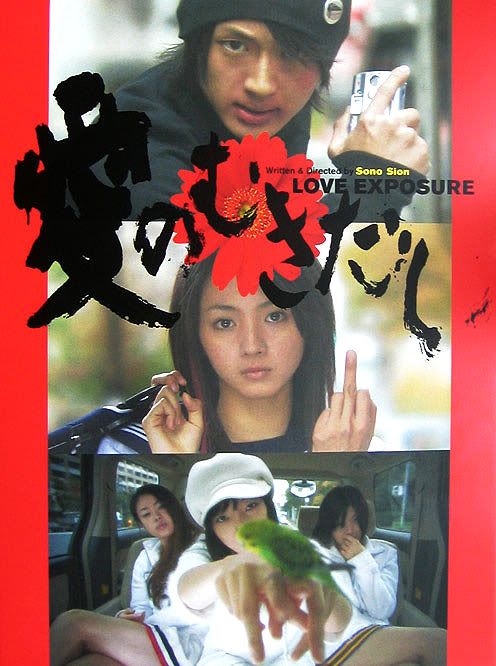
Title: Love Exposure
Rating: 5/5
Genre: Romantic Drama (Avant-Garde)
Starring: Takahiro Nishijima, Hikari Mitsushima, Sakura Ando
Director: Sion Sono
Language: Japanese
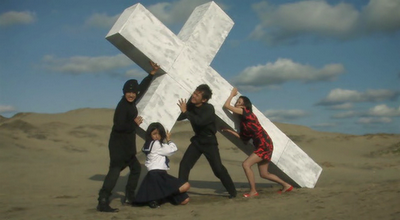 Anyone whose seen my usual tendencies for general carnage, low budget cheese-fests and Sci-Fi eye candy should be surprised to see a rare romantic drama catch my attention – much less one with such a heavy religious theme running at its core – but this is one I wish I had found sooner. Cast aside any notion of a typical boy-meets-girl type scenario, with that done to death unrequited love or the stereotypical chase situation, as this has none of that. This is a four hour long tale of life under the influence of Christianity and the corruption and heatbreak it can cause; of perversity and desperation; manipulative secular cults; chaos and destruction, all in the name of love. There is still that trademark quirkiness that the Japanese seem to have coined for their own but this film goes beyond such a limited view. This is an epic voyage of “Lord of the Rings” proportions and my only regret is failing to find the full six hour version.
Anyone whose seen my usual tendencies for general carnage, low budget cheese-fests and Sci-Fi eye candy should be surprised to see a rare romantic drama catch my attention – much less one with such a heavy religious theme running at its core – but this is one I wish I had found sooner. Cast aside any notion of a typical boy-meets-girl type scenario, with that done to death unrequited love or the stereotypical chase situation, as this has none of that. This is a four hour long tale of life under the influence of Christianity and the corruption and heatbreak it can cause; of perversity and desperation; manipulative secular cults; chaos and destruction, all in the name of love. There is still that trademark quirkiness that the Japanese seem to have coined for their own but this film goes beyond such a limited view. This is an epic voyage of “Lord of the Rings” proportions and my only regret is failing to find the full six hour version. Following the sordid tale of Yu, as much a hero as anti-hero, his early years forced him to witness the death of his mother and the ensuing devotion his father, Tetsu, hence committed to the church, resolving to become a priest. But his resolve was not strong enough to overcome his lust for his new found love, Keiko, a lost woman moved one day by his sermon. As their secret
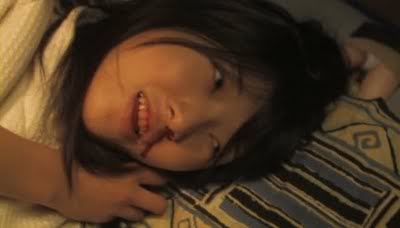 affair starts taking its toll, Keiko leaves him and Tetsu falls into a spiral of depression, forcing his son to the confessional to admit to his sins. Struggling to think of anything, Yu begins to lie about minor sins he has committed but his father quickly sees through him, leaving Yu to take the only course of action he can think of; to go out and commit sins for his father.
affair starts taking its toll, Keiko leaves him and Tetsu falls into a spiral of depression, forcing his son to the confessional to admit to his sins. Struggling to think of anything, Yu begins to lie about minor sins he has committed but his father quickly sees through him, leaving Yu to take the only course of action he can think of; to go out and commit sins for his father.Quickly joining a local gang, he learns the art of fighting and shop-lifting, and it isn't long before he becomes the apprentice of a resident voyeur master, training in the art of upskirt panty-shots. With ninja like moves he soon becomes known as the pervert king for his gifted abilities, but his devotion to his art is not spurred by voyeuristic intentions. Instead, all he wishes is to see his father deny his priesthood training – if only temporarily – and act as his father, and to hunt for his one true love. As fate would have it, his true love would emerge surrounded by thugs, and he would be dressed up as a woman having lost a bet. Nonetheless, he helps her fend off the assailants, giving rise to Yu's counterpart: Miss Scorpion, whom she quickly falls in love with, but there was another watching from afar. Koike is plotting, spying on their developing relationship so that she can tear them apart and have him for herself.
It is at this point that the story takes a decisive turn; to say the tone shifts at this midway point would be a massive understatement. The light and comical first half is merely setting the stage for the dark spiral of madness that follows; the attachment to the characters that is
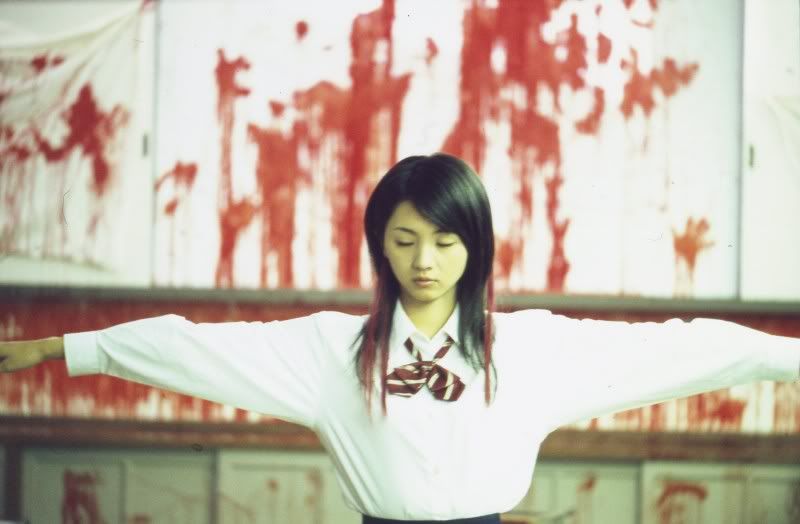 built up lending gravity to the situation; the ever serpentine snaking of the plot never allowing itself to become predictable, always keeping you on the edge of your seat as you struggle to see what's coming next upon the horizon. There aren't the words to adequately describe it all; the manner the director is as content to switch between fragile classical music and punk is just the icing on the cake compared to the uncanny manner he'll succeed in manipulating your mood. Even the genre doesn't seem content to sit in one place; that over-arching romance taking required detours into martial arts style action, horror and thriller territory.
built up lending gravity to the situation; the ever serpentine snaking of the plot never allowing itself to become predictable, always keeping you on the edge of your seat as you struggle to see what's coming next upon the horizon. There aren't the words to adequately describe it all; the manner the director is as content to switch between fragile classical music and punk is just the icing on the cake compared to the uncanny manner he'll succeed in manipulating your mood. Even the genre doesn't seem content to sit in one place; that over-arching romance taking required detours into martial arts style action, horror and thriller territory. The decision to focus on such a small number of characters is not one that can come without its issues, but he manages to avoid all the problems here entirely by creating such detailed backgrounds, letting them change with time in response to events that surround them. They never feel anything less than human in the way they mature and change with time. For all the diversions, none of them feel more fleshed out than that core of three that form the sordid love triangle; the noble panty-shooting hero, Yu, desperate to save his love, the man-hating, heart-wrenching, adorably psychotic Yoko – whose performance in the second half genuinely steals the show – who in turn is in love with his Miss Scorpion counterpart. Then there's the third wheel, that wrench that is thrown into the works that takes the form of the manipulative and evangelical Koike, besotted with Yu and willing to do anything it takes to steal his heart.
The lengthy run-time never overstays its welcome, the unconventional dynamic flow of the piece feeling snappily edited and poignant. The voyeuristic aspect could easily come across as all too
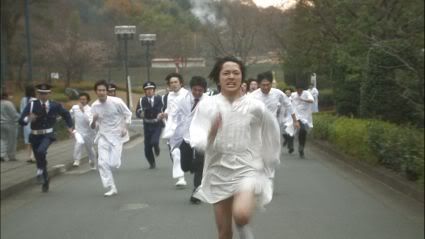 childish and yet despite its obvious humour, it's derived more from the militaristic operational procedure than some absurd for-the-sake-of-it form. And when the focus shifts, neither are his habits forgotten, lending some dark moments as he is manipulated and exposed. There is so much on offer here that I feel compelled to try and make myself as ambiguous as possible; it feels as though the more I say, the more I might spoil. It comes as no particular surprise to discover that long before he became a director, Sion Sono was a renowned avant-garde poet and he seems to have carried his artistic trade into a new medium. I can't think of many films that would be better suited to that lofty title of “masterpiece,” but if you were to watch any film I've discovered this past year, this should be it.
childish and yet despite its obvious humour, it's derived more from the militaristic operational procedure than some absurd for-the-sake-of-it form. And when the focus shifts, neither are his habits forgotten, lending some dark moments as he is manipulated and exposed. There is so much on offer here that I feel compelled to try and make myself as ambiguous as possible; it feels as though the more I say, the more I might spoil. It comes as no particular surprise to discover that long before he became a director, Sion Sono was a renowned avant-garde poet and he seems to have carried his artistic trade into a new medium. I can't think of many films that would be better suited to that lofty title of “masterpiece,” but if you were to watch any film I've discovered this past year, this should be it.
Comments
Post a Comment